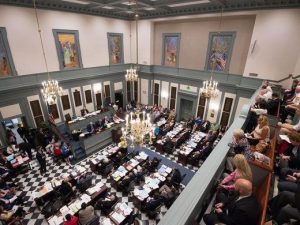By Clara Keane | September 7, 2017 | Advocacy
AATA representatives and Delaware art therapists will proudly witness the signing of the art therapy licensure bill S.B. 43 into law tomorrow, September 8, 2017. Jennifer August, MCAT, ATR-BC shares details about the advocacy journey she and other art therapists in Delaware underwent with strong support from the AATA to achieve this success for the profession. Their story demonstrates the value of leveraging each interaction with the state legislature as an opportunity to promote art therapy legislation and to educate decision makers about how a given bill may improve the local mental health care landscape.
When reflecting on the events leading up to the bill’s passage, August uses the analogy of “riding the Scrambler at the county fair; it looks fun and welcoming but winds up tossing you in many directions.” She describes in her own words the significance of the bill’s passage for art therapists in Delaware and reveals the story of the many events that led up to the Governor’s signature in the subsequent interview with the National Office.
Jennifer August’s Statement on the Passage of S.B. 43
 The precedential, unanimous passage of Delaware’s Art Therapist Licensing Act (SB 43 – Simpson) is a victory for mental health consumers in Delaware and a testament to the strong viability of the profession here. The vote exemplifies a unified, proactive lawmaking model ultimately benefiting consumers wanting to use professional art therapy. The vote to support the recognition and regulation of art therapy as a distinct profession through the establishment of the LPAT and LAAT licenses under the existing Board of Mental Health and Chemical Dependency Professionals (amending 24 Del. C. §30) affirms our resolute ‘licensure watchwords’: There is every legitimate reason to license the art therapy profession ‒ and at this time.
The precedential, unanimous passage of Delaware’s Art Therapist Licensing Act (SB 43 – Simpson) is a victory for mental health consumers in Delaware and a testament to the strong viability of the profession here. The vote exemplifies a unified, proactive lawmaking model ultimately benefiting consumers wanting to use professional art therapy. The vote to support the recognition and regulation of art therapy as a distinct profession through the establishment of the LPAT and LAAT licenses under the existing Board of Mental Health and Chemical Dependency Professionals (amending 24 Del. C. §30) affirms our resolute ‘licensure watchwords’: There is every legitimate reason to license the art therapy profession ‒ and at this time.
A productive partnership with the AATA’s agile, sharp Executive and Public Policy Directors and Board President greatly championed the legislative success of SB 43. Public Policy Director, Dean Sagar, fashioned our 2015 two-page ‘Bill Synopsis’ into a legislative draft, and quickly! With every request or query, the AATA nurtured a dialogue to support licensure efforts, producing strong, contextually-rich, information on our profession ‒ for Delaware’s art therapists, legislators, regulators and the mental health board. Through its professional communications and work, the AATA greatly buttressed the viability of SB43. With such an effective member organization art therapists can call on, it is no wonder the art therapy profession is gaining recognition in law!
Board Agrees Art Therapy is a “Separate and Distinct” Profession: No Other Path to Licensure
Two rule changes occurring in 2015 served to bar some art therapists, including Ms. August, from qualifying for the state’s Professional Counselor of Mental Health (LPCMH) license and to eliminate the LPCMH as a licensing option for art therapists in future years. First, the State Board of Mental Health and Chemical Dependency Professionals adopted rule changes that restricted the ability of applicants to take any additional courses after completion of the master’s degree to meet the education requirements for the LPCMH. Second, the National Board of Certified Counselors (NBCC) announced that applicants for the National Certified Counselor (NCC) credential, which Delaware required for the LPCMH, will need to be graduates of a CACREP-accredited master’s degree programs beginning January 1, 2022. These changes made it clear to August and others that pursuing a separate art therapy license was their only option.
While appealing the Board’s rejection of her application in early 2015, August took the opportunity to educate members about art therapy and show that the education, clinical training, and board examination for art therapist certification were comparable to those of other professions already regulated by the Board. She continued through successive Board meetings to build the case for a separate art therapy license. When the Board voted to approve a resolution supporting separate licensure of art therapists, art therapists in Delaware and the AATA National Office set to work drafting and promoting a licensure bill.
Only one week after her appeal, August and her colleague Nicole Luther, MA, ATR-BC, prepared and circulated among the legislature a draft of the art therapy licensure bill. Shortly after e-mailing legislators, the initial sponsorship interest packet, then-Senator (now Lieutenant Governor) Bethany Hall-Long responded, “I love Art Therapy!” Soon thereafter, in May 2015, Hall-Long hosted the first meeting at her Legislative Hall office with the Delaware Division of Professional Regulation Director David Mangler.
Delaware Mental Health and Regulatory Review Landscapes were Favorable to the Bill
Several components of the Delaware landscape were particularly conducive for passing an art therapist licensure bill. One was Executive Order 60 (EO 60), issued in 2016, which sought reform of “onerous regulatory burdens [that] can dissuade individuals from entering into professions, and can represent a barrier to entry…” Throughout the advocacy work for SB 43, August leveraged the good-intentioned elements of EO 60 as a ‘right-to-work’ mandate.
One element of EO 60 was the consideration of surrounding states’ regulatory standards for all the professions. All of DE’s neighboring states have art therapy licenses (NJ and MD) or art therapy defined in law as a “closely related field” for the professional counseling license (PA).
August attended three of the four Committee hearings throughout the state for EO 60 and expressed the need for increased access to professional licenses in general and for art therapists in particular. First, she emphasized access for consumers by demonstrating the need for art therapy services within the larger context of a state shortage of mental healthcare. Her second point addressed ‘separate and equal’ professional recognition for art therapists based on the rigorous merits of the profession. August gave examples of qualified providers, other art therapists, leaving due to superior practicing laws in the three neighboring states, which shortchanges consumers of art therapy services. She further advocated for art therapists’ right to work commensurate with training, unique ability, and experience, as similarly situated professionals.
Support for SB 43 was demonstrated through its ten bicameral, bipartisan sponsors, including co-primes Senate Minority Leader (Simpson), Senate Majority Leader (Henry), and House Minority Leader (D. Short). First introduced in the Senate Elections and Government Affairs Committee on June 21, 2017, the bill sprinted through unanimous passage on the Senate floor the following day.
The All-Nighter: When things got political

An All-Nighter (June 30 into sunbreak July 1): In the final hours of the Delaware Legislative Session, Jennifer August, MCAT, ATR-BC (in pink) attempts to have SB 43 moved from the ‘Must Pass List’ to a House agenda one day after SB 43 was released from a House Committee. (Photo courtesy of Delaware News Journal).
The morning of June 29, art therapists Jennifer August, Nicole Luther, and Terri Willis headed to Legislative Hall where the House Policy Analysis and Government Accountability Committee released SB 43 to the House, with only one day remaining before the end of the Session.
On June 30th, with one hour of the day remaining, and with no news on SB 43, August headed for the Capitol. In the early minutes of July 1, she arrived at Legislative Hall to speak with her Representative Peter Schwartzkopf (D), who also is the Speaker of the House. She spoke with him at 3:30 a.m. during a break and was assured that SB 43 would be placed on an agenda. Moments later, his staff notified her that the bill would not be heard, as budget negotiations had become heated. August was advised to go home but chose to stay until the end. At 5:20 a.m., the House recessed with a 72-hour interim budget passed and a mandate from Governor John Carney to return on Sunday to pass a budget (Delaware was among the eleven states that failed to pass a budget for FY 2018). Schwartzkopf placed SB 43 on the agenda.
On Sunday, July 2, 2017, SB 43 unanimously passed the Delaware House at 10:02 pm.
Bill Becomes Law
Tomorrow, September 8, 2017, Governor John Carney will sign the bill into law.
August hopes that art therapists in other states will read about her story and choose to get involved in art therapy legislation in their states. She reminds them that “[licensure] advocacy can be achieved through many pathways, depending on the individual style of each art therapist, recognizing the work to be done to garner strong support from the ultimate ‘deciders’ — the voting legislators.”
The following individuals will share remarks at the Governor’s signing ceremony: Governor, John Carney; Senate Minority Leader Gary Simpson (R); Director, Division of Professional Regulation, David Mangler; art therapists Jennifer August, MCAT, ATR-BC and Nicole Luther, MA, ATR-BC; and AATA Executive Director, Cynthia Woodruff. A separate article with pictures from the signature ceremony will be featured in an upcoming issue of Art Therapy Today.
Many thanks to Jennifer August and her colleagues, Nicole Luher; Lorraine Dempsey, MA, ATR-BC; Christine McCann-Giardina, MS, ATR-BC LPCMH; Lindsay Lederman, MPS, ATR-BC, LCAT; and Terri Willis, ATR-BC for their success in advancing recognition of art therapy as a distinct mental health profession. The current momentum of licensure bills passing throughout the country offers the potential for many more achievements for the art therapy profession in the 2018 session and going forward.

